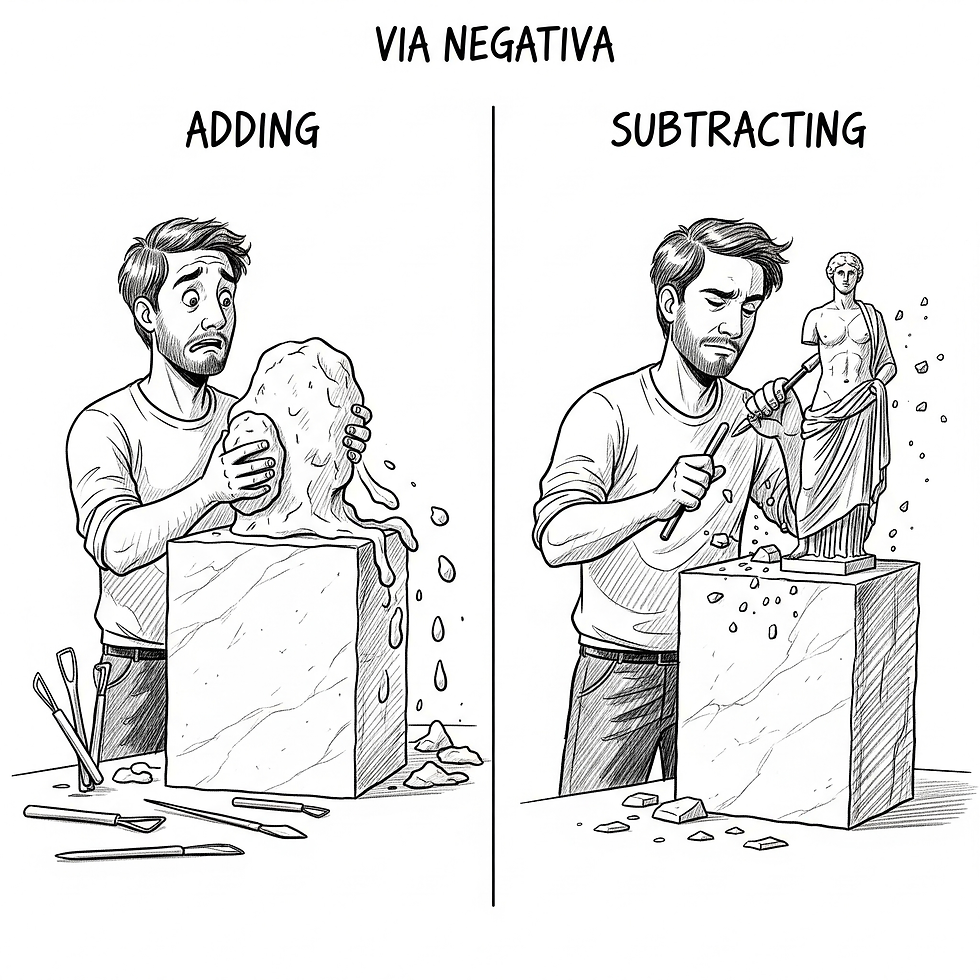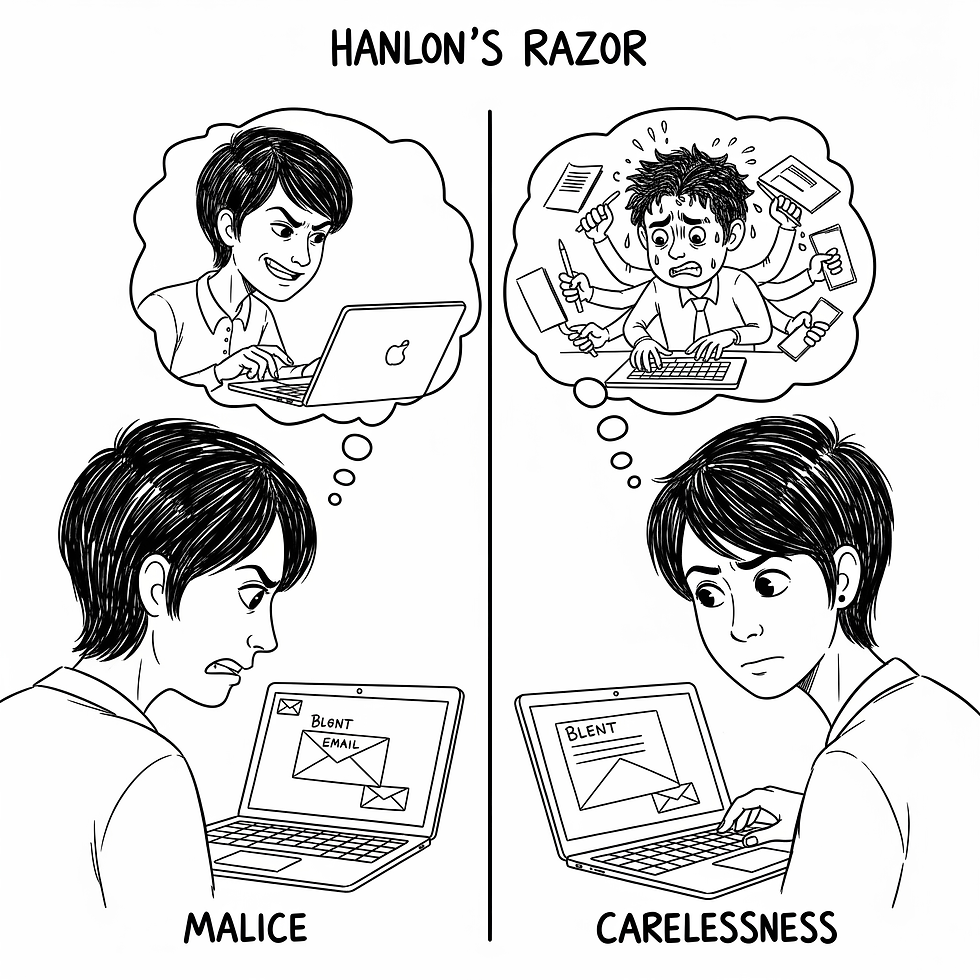Overcoming Loss Aversion for Smarter Investing
- Stefan Sager

- Aug 16
- 6 min read
Updated: Oct 2
At its core, Loss Aversion is the observation that for human beings, the emotional impact of a loss is significantly more intense than the emotional impact of an equivalent gain. This is not merely an intuitive feeling, but a quantifiable psychological phenomenon. Seminal research by Nobel laureate Daniel Kahneman and his colleague Amos Tversky established that
The pain of losing is psychologically about twice as powerful as the pleasure of winning.
This simple yet profound asymmetry explains a vast range of seemingly irrational behaviours, especially in the world of finance. This article will provide a comprehensive analysis of this powerful mental model: a pervasive force that shapes outcomes in boardrooms, influences personal health, and dictates the dynamics of social relationships.
By understanding its mechanisms, you can transform yourself from a passive victim of an innate psychological tendency into an informed architect of your own choices.

I. The Core Idea.
Losses Loom Larger Than Gains
The concept of Loss Aversion was formally introduced in 1979 by Kahneman and Tversky in their groundbreaking paper on Prospect Theory. This work fundamentally challenged traditional economic models, which assumed a "rational actor" who makes decisions by logically weighing outcomes.
Kahneman and Tversky demonstrated that people do not evaluate choices based on their absolute final state of wealth, but rather on the potential gains and losses relative to their current situation, their reference point. This was a revolutionary shift. It means the utility we derive is not from the absolute level of wealth, but from the change in wealth.
A billionaire losing $1 million might experience more psychological pain than a middle-class individual gaining $10,000, because the former is framed as a loss from a high reference point, while the latter is a gain from a lower one. The principle is perfectly encapsulated in the expression "losses loom larger than gains." It dictates that our choices are often motivated more by a desire to protect what we already have than by an ambition to acquire something new.
The default state is one of conservation, where the primary goal is to avoid moving backward from our current position.
II. The Practical Toolkit.
A Framework for Rational Decisions
Simply being aware of Loss Aversion is often insufficient to overcome it. The most effective strategies are not based on willpower, but on creating systems that minimise the role of in-the-moment emotion.
Financial Health. Systematize and Automate.
Nowhere are the consequences of Loss Aversion more damaging than in investing. The most common manifestation is the Disposition Effect: the tendency to sell winning assets too soon while holding onto losing assets for too long. To fight this, create a rules-based investment plan that covers the whole journey. What future conditions would allow you to sell the investment?
Business Health. Fight the Sunk Cost Fallacy.
Loss Aversion is the psychological engine behind the Sunk Cost Fallacy, which causes leaders to often throw good money after bad on failing projects. The decision to abandon a project is framed as the painful act of crystallising a past loss. To fight this, leaders must cultivate a culture that psychologically separates past decisions from future ones. Frame choices not around the potential loss of past investments but around the potential gain of future opportunities. A powerful technique is to regularly ask the question: "If we were not already invested in this, would we, knowing what we know now, invest in it today?" If the answer is no, it might be time to cut your losses. This prevents the emotional attachment to sunk costs from clouding a rational assessment of a project's future prospects.
Personal Health. Use It as a Commitment Device.
Loss Aversion is a primary reason breaking bad habits is so difficult. The immediate, certain "loss" of giving up the comfort of a favourite unhealthy food feels far more potent than the abstract, distant "gain" of improved health. However, this can be flipped. Once a positive habit is established, the new, healthier state becomes the status quo. The primary motivator then becomes the fear of losing the progress you've made. This is the force behind commitment devices. A classic example is a platform like Stickk, where you put real money on the line that is forfeited if you fail to meet your goal, often to an "anti-charity" you despise. The anticipated pain of this loss is a powerful motivator to overcome procrastination.
Physical Health. Reframe Your Motivation.
The fear of losing one's current fitness level can be a more powerful driver of consistency than the abstract goal of becoming even healthier. A study on motivating employees to walk 7,000 steps a day found that a loss-framed incentive (where money was taken away for each day the goal was missed) was nearly 50% more effective than a gain-framed incentive (where money was earned for each day the goal was met). This is because the money, once allocated, was immediately incorporated into their mental reference point, and the desire to avoid losing it was a potent motivator. You can apply this by tracking streaks for workouts or healthy eating; the desire not to "break the chain" and lose your streak can be a powerful force for consistency.
Social Health. Overcome the Fear of Difficult Conversations.
In many relationships, a suboptimal but stable status quo can persist because people are afraid to risk a loss by addressing underlying issues. The potential pain of losing harmony or even the relationship itself is weighed far more heavily than the potential gain of a more honest, deeper connection. To overcome this, reframe the choice by focusing on the greater long-term loss of inaction, the slow, certain erosion of the relationship as unaddressed issues fester and resentment builds. The small, immediate risk of a difficult conversation is often far less damaging than the large, creeping risk of a connection dying from a lack of honesty.
III. The Everyday Analogy.
The Coin Flip Dilemma that mirrors Loss Aversion in Investing
To make the abstract concept of Loss Aversion tangible, Kahneman and Tversky used a simple thought experiment. Imagine you are offered a bet on a fair coin flip. If it lands on tails, you lose $100. What is the minimum amount you would need to win on heads to make this gamble acceptable to you?
A rational actor should accept if the potential gain is anything over $100. However, experiments consistently show that most people require a potential prize of around $200 to offset the psychological pain of a potential $100 loss. This 2:1 ratio reveals the powerful, non-negotiable premium our minds place on avoiding a loss. The potential joy of winning $150 is simply not enough to compensate for the anticipated pain of losing $100.
IV. The Deeper Dive.
An Evolved Instinct for Survival
The power of Loss Aversion suggests it is a deeply rooted feature of human cognition, forged by natural selection. For our ancestors living in a world of scarcity, the consequences of gains and losses were starkly asymmetric. Gaining an extra handful of berries was a bonus, but losing your entire food supply to a predator could mean death. In such an environment, an organism acutely sensitive to threats and losses would have a significant survival advantage. Natural selection likely favoured brains with a strong negativity bias.
Neuroeconomic studies confirm this; financial losses activate the same primitive brain regions, like the amygdala, that are associated with processing fear and danger.
Our visceral reaction to a stock market downturn is, in a neurological sense, not dissimilar to our reaction to the sight of a predator.
This evolutionary software, while adaptive for ensuring survival, has become maladaptive in modern domains like investing, where taking calculated risks is essential for growth.
V. The Advanced Context.
Expert Insights into a Web of Biases
The expert insight into Loss Aversion is not just knowing what it is, but understanding its role as the central star in a constellation of related biases that all stem from the way we evaluate outcomes relative to a reference point.
The Endowment Effect
This is the finding that people place a higher value on an object they own than they would pay for the same object if they did not. Once an item becomes part of our endowment, giving it up is framed as a loss. As a result, we demand a higher price for it than a buyer—who frames it as a gain—is willing to pay. The expert takeaway is that ownership is not a rational calculation; it is an emotional state that instantly changes an object's perceived value by anchoring it to our fear of loss.
This is the bias where people's decisions are influenced by how information is presented. A choice framed in terms of potential gains encourages risk-averse behaviour, while the exact same choice framed in terms of potential losses encourages risk-seeking behaviour. The expert insight here is that there is no such thing as a "neutral" presentation of information. Every choice is framed, either intentionally by others or unintentionally by our own minds. Mastery involves learning to consciously reframe choices from multiple perspectives to de-bias our decisions.
The ultimate path to mastery is recognising that Loss Aversion is not a flaw that can be eliminated, but a fundamental feature of our cognitive architecture. The goal is to design our environment, our systems, and our decision-making processes to account for this powerful force, transforming it from an unseen adversary into an understandable and manageable feature of our own minds.
We appreciate you subscribing (below) it allows us to:
Publish new Mental Models every week.
Remain 100% independent and ad-free.
Grow our library of resources for the community.
All resources can be found here



Comments